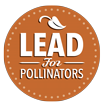by Becky Johnson, Vice President, LEAD for Pollinators Board of Directors
What is your reaction to a bee buzzing by? Is it the same as when you see that gorgeous butterfly flitting from flower to flower? Ever wish for summer to end so the bugs would die off? What if they actually did and never returned?
Diversity unlike any other
Many of our pollinators come in such diverse combinations that it is hard for even fans to engage in distinguishing their differences. Sure, it is easy to tell a butterfly and a hornet apart, but many solitary bees and flies like extremely similar mid flight. All of our pollinators hold a special key to our food chain- pollination, it’s even in their name. They do what they do best- travel from bloom to bloom transferring vital components that allow the vegetation to grow. Almost everything we eat is created with their help. Yes, there are some foods that do not require pollinators such as corn and rice. But if flavor is the spice of life, there is no life without all these wonderful bugs.
They love an opportunity!
Bugs in general can fit into some small places! A crack in the siding or soffit to your house can quickly become the busiest highway for a colony of honey bees. Have an overhang on your porch? Bet your bottom dollar that wasps have taken up a nest there at some point. Mammals in general are opportunistic, but pollinators have a special niche; being small enough to fit into some odd places. Typically, if you do find them taking up residence, they only wish to co-reside, but they can be problematic. Providing them with alternatives- such as a solitary bee box, that burn pile you never got to, etc.- can create wonderful habitats away from humans. Consider adding bat boxes near the eaves of your house- a common predator of some flying bugs, as well as an important pollinator. What about those mean wasps and hornets? A large paper bag tied to fishing string to imitate a roundish nest tends to ward them off. Increasing birds by offering birdhouses can also contribute to less bugs near your home, as they are natural predators of most insects; as a bonus, they have some of the best songs in all of nature.
How Can YOU help pollinators?
It doesn’t take much to assist our powerful, necessary pollinators. In fact, it is actually easy! Clover, for example- is an essential first spring resource for honey bees. Other pollinators love fallen leaves, and some even survive through the winter under them. All that yard work seems less attractive now for another reason, right? It’s not about just planting flowers; that does help- especially on larger scales, but is not a full course for many important bugs on which we rely. When sweltering temperatures arrive, consider putting out a small bowl of water with rocks or pebbles in it- or take this as a reminder to refill that bird bath. Just as in humans, water is essential. Another idea is to support your local groups that advocate for pollinators. Whether it’s a national group, your local bee club or your local beekeeper- there are literally thousands that champion the pollinator cause. Will you be one of them?
What if pollinators died off?
We discussed many ways you can help your pollinators, but let’s talk of the future. In the last 10 years, humans have seen a 41% drop in insect population. So, what IF the bugs did die off and your summer wish came true? Firstly, larger insects that prey on the smaller insects would die off. Slowly, the birds and bats would follow. During the same time most fruits and vegetables would cease to be pollinated. Although this can be done by human hands, it is expensive and time consuming. In turn, this would cause prices for all fruits and vegetables to sky rocket and most flowers to not return the following year. Gradually, all meat prices would rise as well, due to feed prices being too expensive of the grasses that must be pollinated. Our entire food supply would crumble over time. Also, take into consideration that many animals would start to become extinct, as their food supply is parallel to ours.
So my question to you- after reading how easy it is to help, what will you do for pollinators?
